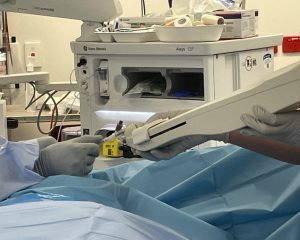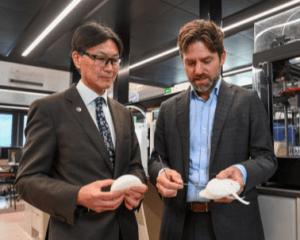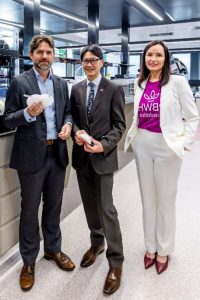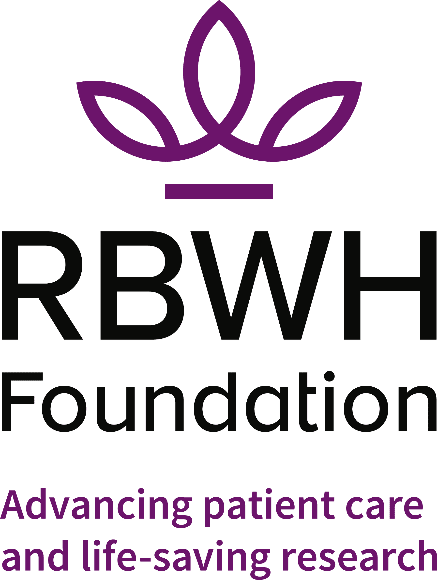ADVOCATE. COLLABORATE. EDUCATE. INNOVATE
The Comprehensive Breast Cancer Institute facilitates best practice breast care for patients through clinical care coordination, innovation, education, and research.
The Comprehensive Breast Cancer Institute facilitates:
- interdisciplinary breast cancer care
- clinical, basic and translational research
- education for treatment providers, patients and the community.
The service model will ensure high quality comprehensive accessible care is available for all patients with breast cancer and other breast diseases across the Metro North catchment, through an integrated, networked service that:
- provides a positive patient experience
- enables patients to be treated as close to home as possible
- has an evidence-based care pathway
- develops local expertise and clinical regional leaders with a specialised interest
- provides advanced diagnostics and specialist services for high risk patients
- produces the next generation of national and international leaders in breast disease.
Comprehensive Breast Cancer Institute Upcoming Events
GP Education Event – Saturday, 14 June 2025.
Community Forum – Thursday, 2 October 2025.
Breast Care Nurse Education Event – To be announced.
Comprehensive Breast Cancer Institute (CBCI)
Metro North Health
Level 7, Block 7
Royal Brisbane and Women's Hospital campus
HERSTON QLD 4029
Email: cbci@health.qld.gov.au
Setting the scene
Metro North Health is the largest public provider of health services in Australia. Metro North operates acute facilities at the Royal Brisbane and Women’s Hospital (RBWH), The Prince Charles Hospital, Caboolture Hospital, Redcliffe Hospital, Kilcoy Hospital and the Surgical, Treatment and Rehabilitation Service (STARS).
Breast cancer services are provided at many facilities across Metro North, with the overwhelming proportion of care undertaken at RBWH. Services provided across Metro North include:
- screening, imaging and diagnostics
- oncoplastic breast surgery and reconstruction
- chemotherapy and radiotherapy
- palliative and supportive care.
Breast cancer management is a highly complex decision-making environment for patients. Patients depend on expert clinical and allied support teams for direction. It is therefore vitally important that health providers for these patients have a shared understanding of best practices to ensure the patient receives optimal care.
The Orchid Press
Our commitment to keeping you well informed is exemplified through our quarterly newsletter, The Orchid Press. The newsletter will feature patient stories, insightful breast care knowledge, the latest developments and innovations, and other helpful resources. Feel free to subscribe by emailing cbci@health.qld.gov.au. If you have anything you would like us to feature in our quarterly newsletter, please email: cbci@health.qld.gov.au
The Orchid Press | Edition 1 | January-March 2024
The Orchid Press | Edition 2 | April-June 2024
The Orchid Press | Edition 3 | July-September 2024
CBCI’s Publications
CBCI’s Mentions

Proudly supported by










 We exist to connect those who wish to give with the most potent opportunities to make a difference, now and into the future and support CBCI’s vision to enhance seamless clinical care, health innovation, community education and world-first medical research.
We exist to connect those who wish to give with the most potent opportunities to make a difference, now and into the future and support CBCI’s vision to enhance seamless clinical care, health innovation, community education and world-first medical research.

 The Comprehensive Breast Cancer Institute is committed to advocating for patients by fostering a patient-centred approach, ensuring their voices are heard during the decision-making process of their care. By advocating for patients’ rights and preferences the institute aims to empower individuals on their breast cancer journey.
The Comprehensive Breast Cancer Institute is committed to advocating for patients by fostering a patient-centred approach, ensuring their voices are heard during the decision-making process of their care. By advocating for patients’ rights and preferences the institute aims to empower individuals on their breast cancer journey. Through interdisciplinary breast cancer care, clinicians, researchers, and primary care providers join forces to create a seamless continuum of care. This collaborative effort enhances the collective expertise, leading to innovative and effective strategies for breast cancer diagnosis, treatment, and research.
Through interdisciplinary breast cancer care, clinicians, researchers, and primary care providers join forces to create a seamless continuum of care. This collaborative effort enhances the collective expertise, leading to innovative and effective strategies for breast cancer diagnosis, treatment, and research. By disseminating knowledge on breast cancer care and prevention, the Institute seeks to empower healthcare professionals, equip patients with informed choices and raise awareness within the community, with the goal to contribute to early detection and improved outcomes.
By disseminating knowledge on breast cancer care and prevention, the Institute seeks to empower healthcare professionals, equip patients with informed choices and raise awareness within the community, with the goal to contribute to early detection and improved outcomes.